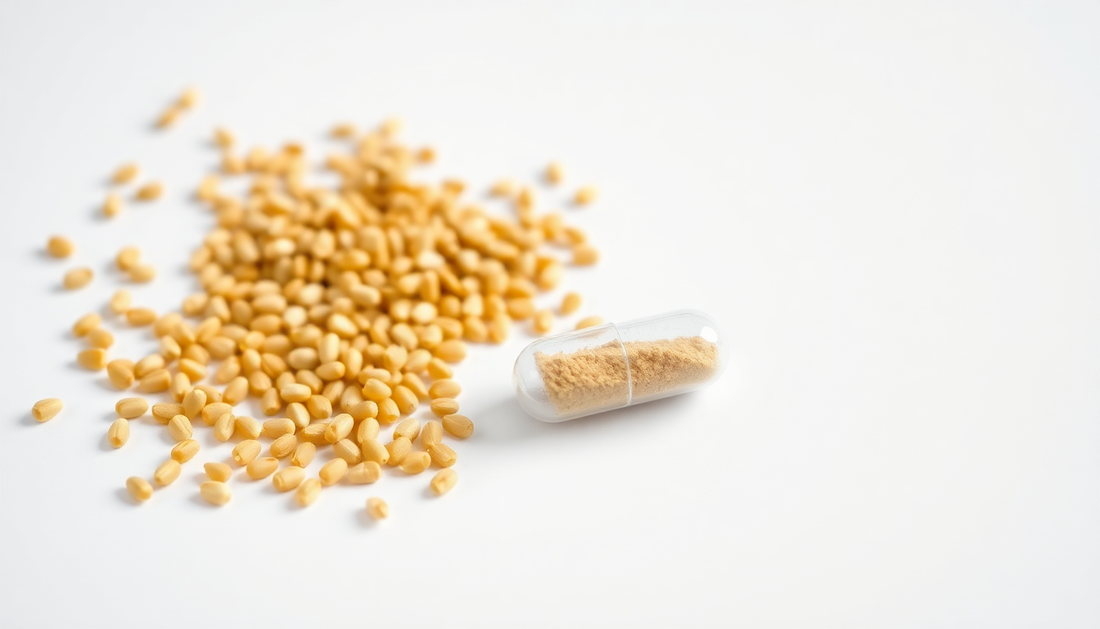Libérer le pouvoir du fenugrec pour stimuler la production de lait maternel
- Bienfaits du fenugrec :
Le fenugrec, aussi appelé méthi, est un galactogène populaire utilisé pour stimuler la production de lait maternel. Des études scientifiques suggèrent que le fenugrec peut augmenter la production de lait grâce à sa diosgénine, un composé censé imiter l'œstrogène.
- Posologie recommandée :
Pour les mères allaitantes, la dose recommandée de fenugrec est d'environ 1 800 à 2 700 mg par jour. On peut généralement y parvenir en prenant 3 à 4 gélules de compléments alimentaires de fenugrec par jour. Il est conseillé de commencer par une dose faible et d'augmenter progressivement si nécessaire.
- Effets secondaires potentiels :
Bien que le fenugrec soit généralement sans danger, certaines mères peuvent ressentir des effets secondaires tels que des troubles digestifs, une odeur de sirop d'érable dans la sueur et les urines, et de potentielles réactions allergiques. Il est essentiel de consulter un professionnel de santé avant de commencer une supplémentation en fenugrec.
- Témoignages réels :
De nombreuses mères ont partagé des témoignages de réussite après avoir intégré le fenugrec à leur allaitement. De l'augmentation notable de la production de lait à l'amélioration des séances d'allaitement, le fenugrec s'est avéré un allié précieux pour de nombreuses femmes souhaitant améliorer leur expérience d'allaitement.
À la découverte des merveilles culinaires de Methi : recettes, conseils et bienfaits pour la santé
- Stimuler la production de lait maternel : Le methi, aussi connu sous le nom de fenugrec, est un galactogène bien connu qui favorise la lactation. Intégrer le methi à l'alimentation, par exemple dans des plats comme le methi paratha ou le methi dal, peut être bénéfique pour les mères qui allaitent.
- Noms populaires à travers le monde : Le fenugrec est également connu sous le nom de « Methi » en Inde, « Hilba » dans la cuisine arabe et « Alholva » dans les traditions culinaires espagnoles. Ces différents noms reflètent la polyvalence du fenugrec dans la cuisine internationale.
- Polyvalence culinaire et saveur : Les graines et les feuilles fraîches de methi sont des incontournables de la cuisine indienne, moyen-orientale et méditerranéenne. Le methi apporte une saveur légèrement amère distinctive, qui rehausse les plats comme les currys, les ragoûts et le pain.
- Bienfaits pour la santé et valeur nutritionnelle : Le méthi est riche en fer, en fibres et en antioxydants. Il facilite la digestion, régule la glycémie et possède des propriétés anti-inflammatoires. Une consommation régulière de méthi peut favoriser le bien-être général.
Perspectives mondiales : Le fenugrec dans différentes cultures et noms populaires à travers le monde
- Un bienfait pour le lait maternel : communément appelé Methi, le fenugrec est célébré dans toutes les cultures pour sa capacité à améliorer naturellement la production de lait maternel chez les femmes qui allaitent.
- Noms populaires : Le fenugrec porte différents noms dans le monde entier, tels que Hilba dans les pays arabes, Methi en Inde et Hulba en Égypte, reflétant sa présence et son importance étendues dans divers paysages culinaires.
- Traditions culinaires : Présent dans toutes les cuisines du monde, le fenugrec est une herbe essentielle qui non seulement apporte une saveur particulière, mais offre également de nombreux bienfaits pour la santé. Il est utilisé dans les currys indiens, les plats éthiopiens comme l'injera et les mélanges du Moyen-Orient comme le zaatar.
- Importance culturelle : Au-delà de ses usages culinaires, le fenugrec revêt une importance culturelle. Dans l'Égypte antique, il était utilisé pour les pratiques d'embaumement, tandis que dans la médecine traditionnelle chinoise, il était apprécié pour ses propriétés curatives. Le fenugrec figure également dans la mythologie grecque comme symbole d'amour et de croissance.
La science derrière le fenugrec : son profil nutritionnel et ses propriétés médicinales
- Amélioration du lait maternel : des études suggèrent que le fenugrec, également connu sous le nom de Methi, a été historiquement utilisé comme galactagogue pour augmenter la production de lait maternel chez les femmes qui allaitent.
- Composition riche en nutriments : Le fenugrec est une riche source de vitamines, de minéraux et d’antioxydants, notamment de fer, de magnésium et de vitamine B6, essentiels à la santé et au bien-être général.
- Propriétés médicinales : Les graines de fenugrec contiennent des composés comme la diosgénine, connus pour leur potentiel à réduire le taux de sucre dans le sang, à réduire l'inflammation et à améliorer la santé digestive.
- Recherche et applications modernes : Des recherches scientifiques en cours suggèrent que le fenugrec pourrait avoir des applications potentielles dans la gestion du diabète, la promotion de la santé cardiaque et même l’aide à la perte de poids en raison de ses composants bioactifs uniques.
Capsule de fenugrec

Nom du produit : Capsule de fenugrec
Description : Le fenugrec, dont le nom botanique est Trigonella foenum-graecum, est originaire d'Asie occidentale et du bassin méditerranéen. Qu'il s'agisse de graines cubiques, de feuilles fraîches ou de pousses, cette plante traditionnelle a trouvé sa place dans de nombreuses cuisines indiennes, notamment dans les pickles, les currys de légumes et les mélanges d'épices utilisés pour aromatiser les plats. Le fenugrec, ou methi, est largement utilisé dans la cuisine indienne pour ses nombreux bienfaits pour la santé. C'est un ingrédient de base qui peut être utilisé de multiples façons : légèrement grillé, réduit en poudre ou trempé dans l'eau. La tradition ancienne raconte que le mucilage contenu dans les graines de fenugrec permettait aux Égyptiens d'utiliser la poudre pour embaumer les momies. L'ayurvéda, science holistique, atteste également de l'utilisation de la poudre de fenugrec. La poudre de fenugrec est une source inépuisable de nombreux nutriments bénéfiques pour la santé, tels que des fibres alimentaires, des protéines, des vitamines B1, B2, B3 et C, du zinc, du fer, du cuivre et des acides gras polyinsaturés. Il contient également des constituants bioactifs comme des saponines, des huiles volatiles, du mucilage et des alcaloïdes comme la choline et la trigonelline.
- Prix : 11,99 GBP
- Achetez des capsules de fenugrec
Riche de son histoire et polyvalent dans ses applications, le fenugrec est un ingrédient puissant, célébré dans le monde entier pour ses multiples vertus. De ses utilisations culinaires séculaires à son rôle essentiel dans l'augmentation de la production de lait maternel, le fenugrec, connu sous le nom de Methi dans de nombreuses régions, demeure un ingrédient clé de diverses pratiques culturelles à travers le monde. Exploré à travers les créations culinaires et la médecine traditionnelle, son riche profil nutritionnel est souligné par de puissantes propriétés médicinales. Alors que les perspectives mondiales convergent vers cette plante exceptionnelle, l'essence du fenugrec transcende les frontières, résonnant sous divers noms populaires aux quatre coins du monde. Qu'il s'agisse de découvrir la science derrière ses bienfaits ou de valoriser ses merveilles culinaires et médicinales, le fenugrec perpétue un héritage de santé, de saveur et de bien-être sans égal.
















































